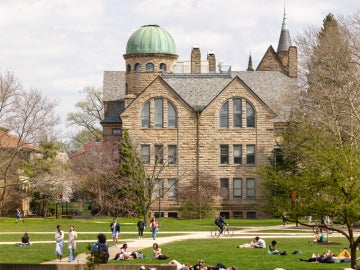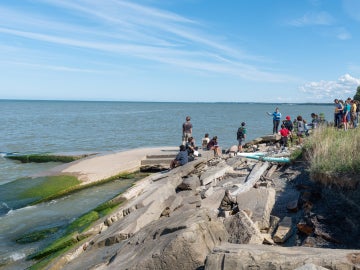Teaching as An Act of Translation: Reflections from Professor Emilia Bachrach
August 20, 2018
Erin Ulrich ’18

Professor Emilia Bachrach
Photo credit: Jennifer Manna
Assistant Professor of Religion and Gender, Sexuality, and Feminist Studies Emilia Bachrach uses her classroom as a space for interdependent learning as well as reflection on her own research.
Professor Emilia Bachrach is no stranger to the research areas she approaches in her upcoming publications, which include a monograph on practices of religious reading in Pushtimargi Hinduism as well as a book of translations from an 18th-century manuscript, In the Service of Krishna. Her ethnographic work in Western India began as part of an undergraduate study away program in Varanasi, India, where she studied women’s performance of devotional songs to the deity Krishna.
Since this first research stint, Bachrach has returned to India each year—devoting her adult life to a continuum of return, reflection, and refinement of existing intellectual and research projects.
Bachrach’s research focuses on analyzing religious texts, including oral and written texts in early modern and modern languages as well as conducting ethnographic work in Western India. At Oberlin, she teaches courses on topics such as religion, gender, and sexuality in India (one course is aptly named such) and Hindu religious practice.
Bachrach studies not just what, but how and why people engage in religious practices, which she says is the heart of where her current and ongoing projects lie. “I approach religious reading as a kind of lived, performative practice which I argue is inherently embedded in people’s everyday lives—the ways in which they make and remake their social, familial, and devotional worlds.”
Her most recent publication was featured in the Journal of Hindu Studies, titled “In the Seat of Authority: Debating Temple Spaces and Community Identity in a Vaiṣṇava Sampradāy of Contemporary Gujarat,” in which she unpacks the complex history and contemporary political ramifications of constructing public places of worship in Gujarat.
But her research on temple renovation efforts carried out by an increasingly shifting, economically privileged urban demographic reaches far outside the realm of academic discourse. She says, “These discussions are absolutely not specific to academic debates—they are widespread, daily debates in the media in south Asia and affect people’s lives on a very visceral level.”
Although she has decades of experience in the field, Bachrach says that her classrooms in Oberlin allow her to step back, take off her “research hat,” and explore feminist research theory and methods with her students as they approach them for the first time. “Teaching, especially in Feminist Research Methodologies, has helped me clarify roadblocks I’ve come up against in the field and reapproach them, theorizing them more clearly.”
Through interactions with her students, Bachrach says she engages in a sort of meta-translation by adapting literature so that it is useful to them.
“My favorite thing about my students is their sincerity. They really want to make use of material that I teach, not only academically but in their everyday lives and activist endeavors. The sincerity and enthusiasm of Oberlin students really stands out.”
By participating in a reciprocal learning endeavor—translating course material for her students, but also accompanying them on their primary engagements with feminist methodologies—Bachrach continues the most important part of her own writing practice in the classroom: a daily, dedicated practice of translation and retranslation.
“Thinking conceptually about my research happens all the time, every day. In the classroom, I’m inspired as I read new literature with my students and with other conversation partners. And of course, I take advantage of breaks.”
You may also like…
Oberlin Launches Critical AI Studies Minor in Fall 2026
With a solid foundation in both science and the humanities, this minor ensures students to understand and be able to analyze the ethical, cultural, environmental, political, economic, technological, and labor effects of AI.
Research Roundup
Every day, Oberlin’s faculty and students produce scholarly work that uncovers new insights into how we understand the world, particularly in the areas of sustainability and the environment.
Three Things with Jillian Scudder
Oberlin’s astrophysicist-author shines a light on our dark universe.


